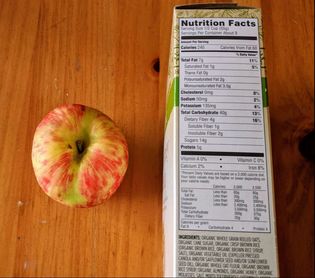
Today, I want to share what I know about calories in the hopes it will help you understand how calories do and do not matter for weight loss and what you should be more concerned about than calories when it comes to being healthy and feeling good. So what is a calorie? A calorie is a unit of energy used to measure how much energy it takes to produce heat. It measures the energy needed to raise the temperature of one gram of water by one degree Celsius. One gram of protein or carbohydrates has four calories. One gram of fat has nine calories. One gram of pure alcohol has seven calories.
1. Counting Calories would lead one to think that reducing fat is good because you would consume less calories. Except, and it's a big except, fat creates satiety, which means it gives you a feeling of fullness. You feel full sooner eating something that has good fats than you will something that has lots of carbohydrates. Carbohydrates, especially in the form of processed foods, not only do not give you a feeling of fullness but they can quickly create a sugar imbalance which leads you to overeat. Certain areas of your body need healthy fats in order to thrive, including your brain. As an aside, there are good fats and bad fats so choose wisely.
2. The type of calories you eat is more important than how many calories you eat. For example, 150 calories of spinach will provide numerous vitamins and minerals to your body, reduce inflammation, and provide fiber for optimal digestion. Fiber, like fat, creates satiety. If you consume 150 calories of cookies, without fiber to slow digestion, your body will break those cookies down quickly into its simplest form, glucose, and send the hormone insulin from the pancreas to transport that glucose around the body to the cells that need it. When there is more glucose than cells that need it for energy, that glucose gets stored as fat. Not only that, but you may feel the effects of a blood sugar spike from the cookies where you have a rush of energy and then you crash and feel tired. Looking for a quick fix, you may turn to the cookies over and over again creating a vicious cycle of energy highs and lows, sugar addiction, glucose stored as fat, and potentially insulin resistance. Rather than looking at a food for the calories it contains, try looking at it for the nutrition it contains.
3. Low calorie foods, especially low-fat foods, are often low nutrient foods, too. They lack fat, vitamins and minerals, and usually have a lot of processed carbohydrates that lead to a cycle of sugar addiction. The whole low-fat food movement is a failure. The government recommended it thirty years ago and as a result today rates of obesity, heart disease, diabetes, some cancers, and autoimmune diseases are at an all time high.
4. When you eat whole foods containing fiber and fat, then counting calories does not matter as much. You'll be less likely to overeat because you'll be satisfied at the end of a meal and for hours after. Your brain won't be addicted to sugar so you'll be better able to feel your body telling you when it is full and when it is hungry.
5. Have you heard the saying, "One person's medicine may be another person's poison," (Donald Karshner)? How you respond to a food, a seemingly good food, may be completely different to how your neighbor, best friend, even aunt may respond. This is an invitation to not only stop counting calories and following specific diets, but to also really feel into how your body responds to food. For example, if I eat whole grain wheat bread, I'll get warts on my feet and spots on my lungs as if I have tuberculosis. However, for my friend Cristina, consuming whole grain bread is a great source of nutrients, including folate, and fiber.
I know from listening to clients that counting calories gives them a measure of control. What can you do instead of counting calories? Eat whole foods (those without a label) over processed foods (those with a label that come in a box, bag, or plastic container). Pay attention to the nutrient density of the food you are eating. Most importantly, listen to your body for clues about what foods nourish it and what foods deplete it.
Sources for this blog post include this article, this book, and this book.

 RSS Feed
RSS Feed